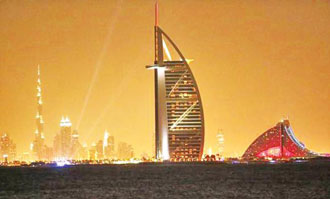|
|
UAE Freezones Biz News Updates
|
|
|
Dubai eying coveted status - Arab world’s creative capital
 A MELTING
POT: A general view shows Dubai's cityscape. (Reuters)
Move over, Cairo, Beirut and Casablanca. Dubai is launching a drive to
become one of the Arab world’s top centers for art, design, film and fashion
- areas that have traditionally been dominated by old Arab cities outside
the Gulf.
Success is not certain. The wealthy emirate is much better known as a
trading and banking hub and luxury shopping destination than as a center for
the arts. It lacks the established cities’ centuries of history and culture.
But Dubai has advantages which the old cities can find it hard to provide:
security, cosmopolitan lifestyles and comprehensive travel links to the rest
of the Arab world.
It is throwing hundreds of millions of dollars and the latest technology
into its effort, using state-linked companies to develop the project in the
same way that it’s successfully jump-started other industries.
“We want to encourage local and emerging talent from within the region,”
said Amina Al Rustamani, group chief executive of TECOM Investments, a
business park operator owned by Dubai ruler Sheikh Mohammed bin Rashid Al-Maktoum.
Other cities have allowed neighborhoods of artists and designers to emerge
over decades. Dubai is not leaving that to chance; TECOM is creating a
purpose-built 21 million square foot area called the Dubai Design District.
Tenants of the district are to include galleries, studios, workshops,
boutique stores and museums, plus office and residential space. The first
phase, to open this year, will cost 4 billion dirhams ($1.1 billion). TECOM
says over 220 companies have agreed to take part.
The Dubai Design and Fashion Council, a state-funded body, plans to set up a
design school with students from around the world. One of the school’s
specialties will be Islamic design.
One early design start-up in Dubai is Bil Arabi, a jewelry business opened
in the emirate nine years ago by Nadine Kanso, a Beirut-born graphic
designer.
Bil Arabi sold 1,500 pieces of jewelry in the shape of Arab calligraphy for
$820,000 last year. Kanso described the pieces as “bling bling with a Middle
Eastern edge,” but with a serious purpose, to explore Arabs’ cultural roots.
Political stability and security were key to her decision to start the
business in Dubai, as war and social tensions can make it hard to operate in
Beirut, Kanso said.
Three British-Iranian brothers in their 20s and 30s, Haman, Babak and Farhan
Golkar, said they founded their high-end clothing brand in Dubai five years
ago partly because the city was younger than the established fashion
capitals, meaning there was room for newcomers.
Emperor 1688’s menswear sales, totaling $3.5 million in 2014, are growing at
double-digit rates and a womens wear line was launched last year. Babak said
Dubai was gradually developing its own fashion style, featuring opulent
touches such as gold-plated suit buttons.
The brand is sold mostly in the Gulf and the Golkars plan to develop sales
in Europe.
“In terms of retail power, Dubai is on a par with any city in the world, and
that’s an important factor for a brand,” Babak said.
In film making, the Arab Spring uprisings of 2011 pushed business toward
Dubai; movies and television series that might previously have been made in
Cairo or Damascus could more safely be shot on a Dubai sound stage, using
computer graphics to generate backdrops.
Film makers in Dubai don’t always operate with quite the same artistic
freedom as they would in their home countries — productions in the United
Arab Emirates must respect local cultural and religious sensitivities.
But such considerations aren’t an obstacle to most films. There were 777
applications to make short films, TV series or commercials in Dubai last
year, up from 741 in 2013; 146 TV channels broadcast from the emirate —
although Dubai faces stiff competition from neighboring Abu Dhabi to host
blockbusters.
“Morocco’s film industry is about 50 years old and Egypt is 80 years. We
can’t match that, but we can compete in convenience, technology and low
costs,” said Jamal Al Sharif, managing director of Dubai Studio City, part
of TECOM.
Apr 13, 2015
|
| |
Courtesy Arab News
|
|

